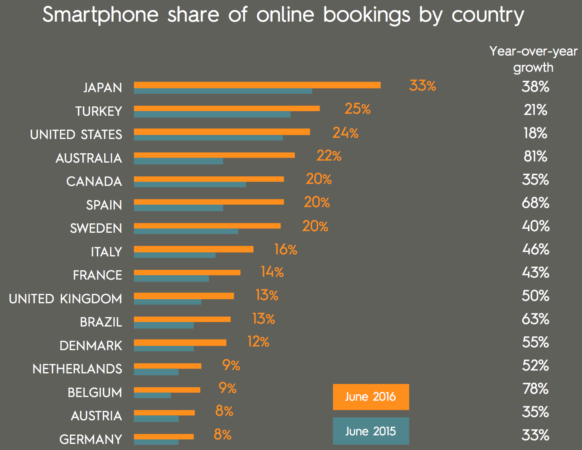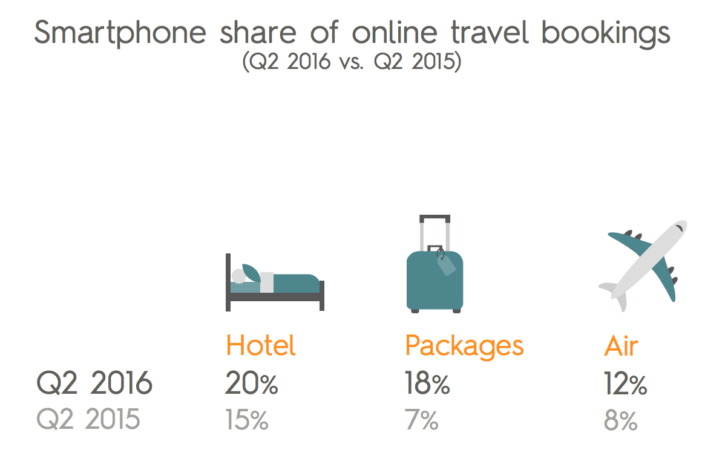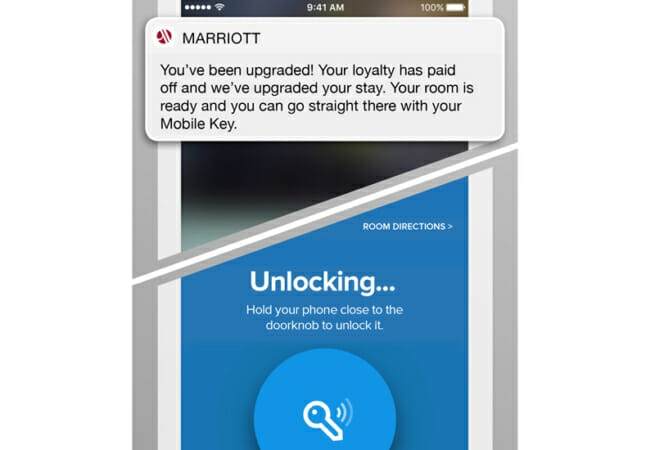How Travel Agencies Can Benefit From the Mobile Revolution
If there's one thing the travel industry has had to come to terms with in recent years, it's the increasing influence of mobile platforms. Not only are smartphones and tablets dominating travel research, social media and bookings themselves, compatibility with these platforms has also become a vital factor in Search Engine Optimisation (SEO). With that in mind, this week we're going to look at how travel startups can harness the power of mobile platforms, cut through the noise and create long-lasting, profitable bonds with tech-savvy travellers.
Why does your travel platform need a mobile strategy?
Mobile devices are becoming more prevalent among travellers, ut it's not only during trips that these come in handy. The majority of people now research trips from a mobile device, while the amount of people making bookings on these platforms is also on the rise.
Here are a couple of enlightening charts from our colleagues at Skift, one the few publications that keeps an even closer eye on the travel industry than we do.

Clearly, there is an upward trend for mobile bookings around some of the world's most popular destinations. What also needs to be taken into account is the ability to make bookings while travelling that mobile platforms provide.
Below is another chart, which suggests that travellers are more comfortable using traditional purchasing methods when it comes to flights - although this number is also steadily rising.

So what does this data tell us? It's obvious that having a smooth mobile platform that travellers can use for research and bookings is vital in this day and age. There's plenty of room for more growth in mobile bookings, so travel agencies and marketplaces that fail to prepare will have prepared to fail.
First of all: Optimise for Mobile
The first step here is fundamental. If travellers can't easily use your marketplace or booking system on a mobile device, you're going to miss out on sales. It's as simple as that. Your platform needs to be optimised for browsing from these devices. Compatibility and ease of use are doubly important when you consider that, as well as losing revenue, you will be punished in search engine rankings for having a poor mobile experience.
That's right: Google will be less favourable to your platform is the mobile experience sucks. Take a look at these three facts, courtesy of Marcus Miller at Search Engine Land:
- Today, more people search on mobile phones than computers
- People are five times more likely to leave a site if it isn’t mobile-friendly
- Over half of mobile users will leave a website if it takes longer than three seconds to load
With these in mind, the first steps toward any mobile marketing strategy should be to:
- Concentrate on ease of use and mobile compatibility
- Ensure your website is responsive from mobile platforms
- Do everything you can to improve your page loadings speeds
These factors can be addressed in many different ways, from streamlining the process for filling in forms, to shortening menus and simplifying the search process.
Read this post on optimising sites for mobile for more information.
Use mobile to personalise the experience
Once your platform is optimised for mobile, the obvious advantage of being in your customers' pockets is the ability to personalise their experience.
Here's a great example of what we mean, from hotel giant Marriot.

The new Marriott Rewards app has been designed to give users a tailored experience. It adjusts depending on which point the traveller is at in their journey. The app will offer content and advice related to trip planning, the day of travel itself, transit and the hotel stay.
Smart devices are now everyone’s indispensable travel companion, as more and more travellers increasingly expect to have their needs satisfied using their mobile phone,” said Marriott International SVP digital George Corbin.
Marriott is using mobile to introduce and revolutionize the next generation of customer service to travelers worldwide, delivering a far more personalized and anticipatory stay experience.” - Marriott International SVP digital George Corbin
Marriott International vice president of loyalty, Thom Kozik, highlighted the connection between offering a personalised experience and the customer loyalty that ensues. “Many people have an emotional connection with their mobile devices and apps they’ve downloaded," he said. “We know some of our most loyal guests stay with us upwards of 100 nights a year. For them, along with members who stay less frequently, we can become a valuable part of their travel experience on a device they engage with 365 days a year.”
Personalising a traveller's experience via mobile can involve anything, from using their name and treating them as a genuine person, to tailoring offers and sending them promotions they have a track record of being interested in. A strong mobile experience gives a travel agency the opportunity the connect with customers directly and treat them as genuine people - there's no better way to build a relationship.
Location is Key
Plenty of research and bookings occur during a trip, not before it. Sure, the big stuff (flights, transfers etc) will probably be arranged before departure, but on longer trips it's highly likely that excursions, activities and maybe even accommodation will be booked while on the road. This highlights the need for our first point: Optimising for mobile. But it also raises the importance of localisation.
Localisation is something we've discussed before, in our piece entitled 'Translation & Localisation; Travel Agents Must Adapt to the Global Marketplace'. The idea is simple. Plenty of travel operators work in the shadow of huge, internet-dominating travel giants. We all know who they are. One key to getting the upper hand is focusing on localisation; becoming a trusted source of bookings and information in your chosen area.
An Ipsos study back in 2014 found that 88% of people make local searches on smartphones, while 61% want mobile search results optimised to their location. It's clear that if you can localise your mobile offering with geographical offers, maps, driving directions and local search results, you'll be giving travellers what they want.
Enable mobile transactions
It goes without saying that if you want to make the most of the mobile booking trend, you need to enable mobile transactions on your website. But this doesn't only stand for transactions of money. Anything that stands to help travellers avoid queues or delays is a positive step. After all, nobody travels through a love of standing in line. Mobile integration of check-ins, room service and reviews can all help to make travelling a more seamless experience.
Moving services onto mobile platforms can boost customer satisfaction. A study by The Center for Generational Kinetics discovered that at 40 percent of millennials prefer customer service that's totally online. Self-service and support via mobile ticks all the boxes of this growing trend.
Rewarding mobile users
Done right, enhancing your mobile offering comes with its own benefits that travellers will appreciate. But that doesn't mean you should stop there. Mobile users taking advantage of self-service systems and following your advice on local activities should be rewarded in some manner. This might be by building a loyalty scheme that gives travellers discounts over time, or offering specific rewards for travellers who provide feedback or share their experience on social media.
Be the Concierge
We've written before on how many travel operators are beginning to use messaging platforms to offer a new type of customer service. The vast majority of mobile travellers will have access to instant messaging platforms such as Whatsapp and Facebook Messenger. As a travel operator, there's a huge opportunity to harness these mediums and provide travellers with real-time customer service.
Smartphones and tablets are providing the capability. It's up to your agency or marketplace to make the most of it.
Stay one step ahead
There are plenty challenges faced by travellers no matter what the destination or trip type. For example, how many travellers have difficulty explaining where their accommodation is to a local driver? How many travellers want to learn some basic phrases in the native language of their destination? How many travellers want easy access to city guides and local things to do? The answer, of course, is millions.
These are all small problems with simple solutions, but mobile offers the key: accessibility. If you can provide directions in the local language, a guide on local things to do, and general assistance in anticipation of a problem, travellers will thank you for it with loyalty.
Make the most of social media
We can't speak about the importance of mobile without touching on social media. Social media platforms such as Facebook, Instagram, Snapchat and Twitter are primarily, or in some cases exclusively, accessed via mobile platforms. Because of this, a large part of any decent travel operator's marketing plan will focus on these avenues. Travel is an industry driven by curiosity and aspiration, so if you can invoke these emotions through a strong social media strategy then you'll be on to a winner.

Post pictures and inspirational videos from your locations or trips, and encourage your customers to share their experience on social media with their networks. Competitions are also likely to spread around platforms such as Facebook and Instagram like wildfire.
Travelshift can help you build a marketplace that's optimised for mobile

Want to build a travel marketplace but intimidated by all the technical challenges? That's where Travelshift software comes in. Our proven solution is fully optimised for mobile use, and comes with a range of features to help you compete with established giants in the travel industry.
Proprietary SEO technology and easy localisation help you use Travelshift to build a community-driven platform that puts content marketing at its core. Want to find out more about the explosive traffic and limitless sales that Travelshift can put at your disposal? Check out our case study for more information.